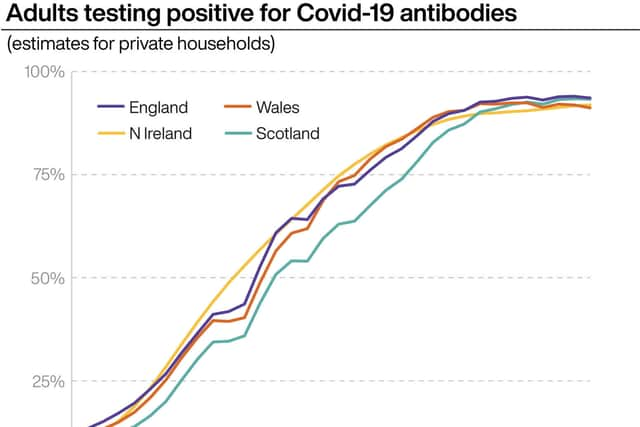Almost 9 in 10 young adults in UK likely to have Covid antibodies
This article contains affiliate links. We may earn a small commission on items purchased through this article, but that does not affect our editorial judgement.
and live on Freeview channel 276
Almost nine in 10 young adults in the UK are now likely to have Covid-19 antibodies, new figures suggest.
Estimates from the Office for National Statistics (ONS) reveal that antibody positivity among 16 to 24-year-olds is “increasing steadily” across all four nations of the UK.
Advertisement
Hide AdAdvertisement
Hide AdWe want to hear from you: let us know what you think about this story and be part of the debate in our comments section below
What do the figures show?
Figures show that among people aged 16 to 24, 88.7% in England and Scotland now carry Covid-19 antibodies.
Similarly high levels are evident in Northern Ireland at 87.2% and 86.9% in Wales.
The figures are based on a sample of blood tests from people in private households from the week beginning 23 August.
Advertisement
Hide AdAdvertisement
Hide AdThe presence of antibodies suggests that individuals have either been infected with coronavirus or have been vaccinated.
It takes the body between two and three weeks after being infected or vaccinated to make enough antibodies to fight it.
Antibodies can remain in the blood at low levels, declining overtime where they slowly become undetectable.
Advertisement
Hide AdAdvertisement
Hide AdIn England, the percentage of 16 to 24-year-olds likely to have Covid-19 antibodies has jumped from 60.6% in the week beginning 21 June to 88.7% in the week beginning 23 August.
In Wales the figure increased from 63.4% to 86.9% in the same period, while in Northern Ireland it has increased from 58.7% to 87.2%.
Scotland has also seen a sharp rise from 51.1% to 88.7%.
What has the ONS said?
The ONS has confirmed that antibody positivity among 16 to 24-year-olds is “increasing steadily across all four UK countries” which has coincided with the vaccine rollout to younger people.
Teenagers aged 16 and 17 have been able to get vaccinated for several weeks, with young adults aged 18 or over eligible for the jab since June.


Advertisement
Hide AdAdvertisement
Hide AdThe ONS said there is a clear correlation between testing positive for Covid antibodies and being vaccinated, but stressed that “the detection of antibodies alone is not a precise measure of the immunity protection given by vaccination”.
What are the figures for other age groups?
According to the ONS, the figures for adults in older age groups have levelled off or declined slightly.
The ONS said: “In more recent weeks our estimates suggest those aged 25 to 64 years have similar or slightly higher antibody levels than those aged 65 years and over
“This is in line with vaccinations for many of those in younger age groups occurring more recently.”
Advertisement
Hide AdAdvertisement
Hide AdIn England, an estimated 91.5% of people aged 80 and over were likely to have Covid-19 antibodies in the week beginning 23 August, down from 93.7% two months earlier.
In Wales the proportion has dropped from 91.5% to 82.0%, while in Scotland it is down from 88.0% to 85.9%.
For Northern Ireland, the estimate for people aged 70 and over has fallen from 93.4% to 87.4%.
In the most recent week, 93.6% of the adult population in England was likely to have tested positive for Covid antibodies, along with 91.2% in Wales, 93.3% in Scotland and 91.9% in Northern Ireland.
A message from the editor:
Advertisement
Hide AdAdvertisement
Hide AdThank you for reading. NationalWorld is a new national news brand, produced by a team of journalists, editors, video producers and designers who live and work across the UK. Find out more about who’s who in the team, and our editorial values. We want to start a community among our readers, so please follow us on Facebook, Twitter and Instagram, and keep the conversation going. You can also sign up to our new
Comment Guidelines
National World encourages reader discussion on our stories. User feedback, insights and back-and-forth exchanges add a rich layer of context to reporting. Please review our Community Guidelines before commenting.
